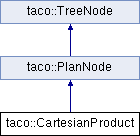CartesianProduct is the physical plan for Cartesian products.
More...
#include <plan/CartesianProduct.h>

Public Member Functions | |
| ~CartesianProduct () override | |
| void | node_properties_to_string (std::string &buf, int indent) const override |
| std::unique_ptr< PlanExecState > | create_exec_state () const override |
| Create the corresponding execution state for the physical plan so that it can be used as physical scan operator later. More... | |
| const Schema * | get_output_schema () const override |
| Each physical plan should link a schema for its output relation, incidating what fields are included in its output records. More... | |
 Public Member Functions inherited from taco::PlanNode Public Member Functions inherited from taco::PlanNode | |
| template<class ... UniquePtrs> | |
| PlanNode (NodeTag tag, UniquePtrs &&...input) | |
| Base constructor for all physical plan node. More... | |
| virtual | ~PlanNode () |
| Deconstructor of PlanExecState. More... | |
 Public Member Functions inherited from taco::TreeNode Public Member Functions inherited from taco::TreeNode | |
| template<class ... UniquePtrs> | |
| TreeNode (NodeTag tag, UniquePtrs &&...input) | |
| virtual | ~TreeNode () |
| TreeNode (TreeNode &&)=default | |
| TreeNode & | operator= (TreeNode &&)=default |
| TreeNode (const TreeNode &)=delete | |
| TreeNode & | operator= (const TreeNode &)=delete |
| constexpr NodeTag | get_tag () const |
| TreeNode * | get_input (size_t i) const |
| template<class Node > | |
| Node * | get_input_as (size_t i) const |
| std::string | to_string () const |
| void | node_to_string (std::string &buf, int indent) const |
| Prints the node contents to a string buffer. More... | |
| const char * | node_name () const |
Static Public Member Functions | |
| static std::unique_ptr< CartesianProduct > | Create (std::unique_ptr< PlanNode > &&left, std::unique_ptr< PlanNode > &&right) |
 Static Public Member Functions inherited from taco::TreeNode Static Public Member Functions inherited from taco::TreeNode | |
| static void | append_indent (std::string &buf, int indent) |
Private Member Functions | |
| CartesianProduct (std::unique_ptr< PlanNode > &&left, std::unique_ptr< PlanNode > &&right) | |
Friends | |
| class | CartesianProductState |
Additional Inherited Members | |
 Protected Member Functions inherited from taco::PlanNode Protected Member Functions inherited from taco::PlanNode | |
| PlanNode * | get_child (size_t i) const |
Utility function to get the raw pointer of i-th child of this physical plan. More... | |
Detailed Description
CartesianProduct is the physical plan for Cartesian products.
This physical plan should remember its child plans (left and right).
Constructor & Destructor Documentation
◆ ~CartesianProduct()
|
override |
◆ CartesianProduct()
|
private |
Member Function Documentation
◆ Create()
|
static |
◆ create_exec_state()
|
overridevirtual |
Create the corresponding execution state for the physical plan so that it can be used as physical scan operator later.
This should create an execution state matching the current physical plan, all its descendant execution states, and link them together.
Implements taco::PlanNode.
◆ get_output_schema()
|
overridevirtual |
Each physical plan should link a schema for its output relation, incidating what fields are included in its output records.
This function returns the output schema of this physical plan.
NOTE: if you want to create a schema owned by the plan, you should make sure ComputeLayout() is called upon the newly created plan so that it can be used in serialize/deserialize records.
Implements taco::PlanNode.
◆ node_properties_to_string()
|
overridevirtual |
Implements taco::TreeNode.
Friends And Related Function Documentation
◆ CartesianProductState
|
friend |
The documentation for this class was generated from the following files:
- plan/CartesianProduct.h
- plan/CartesianProduct.cpp